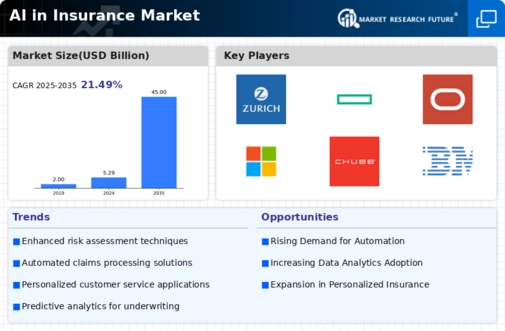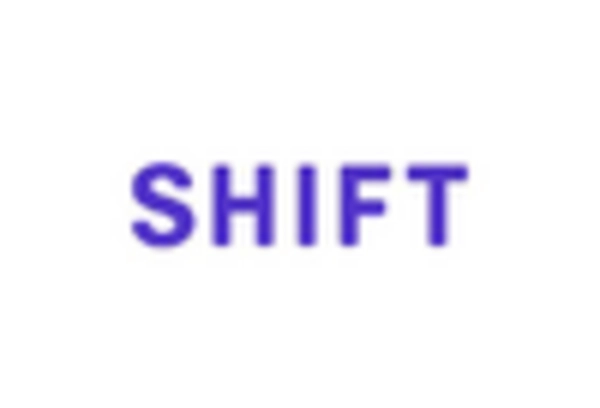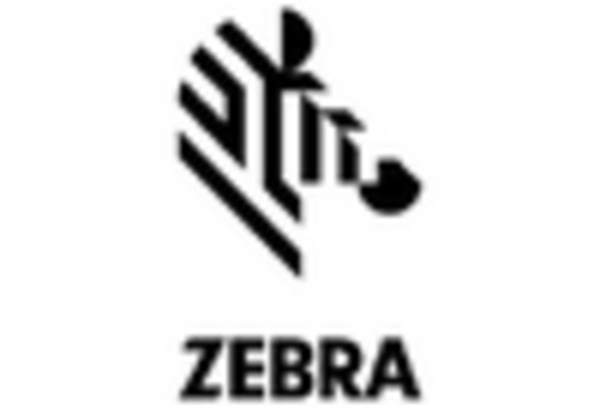Fraud Detection and Prevention
The AI in Insurance Market is increasingly leveraging advanced algorithms to detect and prevent fraudulent activities. By analyzing vast amounts of data, AI systems can identify patterns and anomalies that may indicate fraudulent claims. In 2025, it is estimated that AI-driven fraud detection solutions could reduce insurance fraud losses by up to 30%, translating to billions in savings for insurers. This capability not only enhances operational efficiency but also builds trust with policyholders, as they perceive a commitment to safeguarding their interests. As the sophistication of fraud schemes evolves, the reliance on AI technologies in the insurance sector is likely to grow, making it a critical driver in the AI in Insurance Market.
Enhanced Risk Assessment Models
The AI in Insurance Market is evolving with the development of enhanced risk assessment models that utilize machine learning and big data analytics. These models enable insurers to evaluate risks more accurately and price policies accordingly. By integrating diverse data sources, including social media and IoT devices, insurers can gain deeper insights into customer behavior and risk profiles. In 2025, it is expected that AI-driven risk assessment tools will improve underwriting accuracy by up to 40%, allowing insurers to make more informed decisions. This advancement not only mitigates potential losses but also enhances the overall profitability of insurance products, making it a pivotal driver in the AI in Insurance Market.
Regulatory Compliance and Reporting
The AI in Insurance Market is increasingly focused on regulatory compliance and reporting, as insurers face growing scrutiny from regulatory bodies. AI technologies are being employed to ensure adherence to complex regulations by automating compliance processes and generating accurate reports. This capability is crucial in minimizing the risk of non-compliance penalties, which can be substantial. In 2025, it is projected that AI solutions could reduce compliance-related costs by up to 20%, allowing insurers to allocate resources more effectively. Furthermore, the ability to maintain compliance through AI not only protects insurers from legal repercussions but also enhances their reputation in the market, thereby driving growth in the AI in Insurance Market.
Personalization of Insurance Products
The AI in Insurance Market is witnessing a shift towards personalized insurance offerings, driven by data analytics and machine learning. Insurers are utilizing AI to analyze customer data, preferences, and behaviors, enabling them to tailor products that meet individual needs. This trend is expected to enhance customer satisfaction and retention rates. In 2025, it is projected that personalized insurance products could account for over 40% of new policy sales, as consumers increasingly seek coverage that aligns with their unique circumstances. The ability to offer customized solutions not only differentiates insurers in a competitive market but also fosters deeper customer relationships, thereby propelling growth in the AI in Insurance Market.
Operational Efficiency through Automation
The AI in Insurance Market is experiencing a transformation in operational efficiency through automation technologies. Insurers are adopting AI-driven solutions to streamline various processes, including underwriting, claims processing, and customer service. By automating routine tasks, companies can reduce operational costs and improve response times. In 2025, it is anticipated that automation could lead to a 25% reduction in processing times for claims, significantly enhancing customer experience. This shift towards automation not only allows insurers to allocate resources more effectively but also positions them to respond swiftly to market changes, thereby reinforcing their competitive edge in the AI in Insurance Market.

















